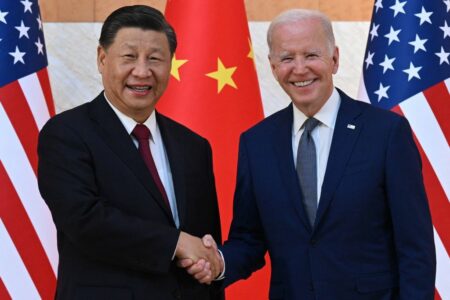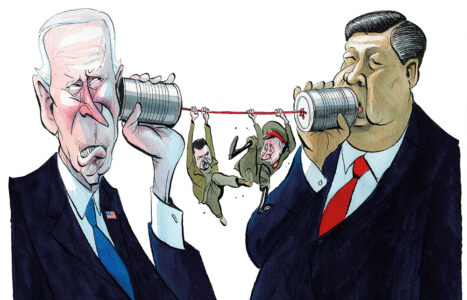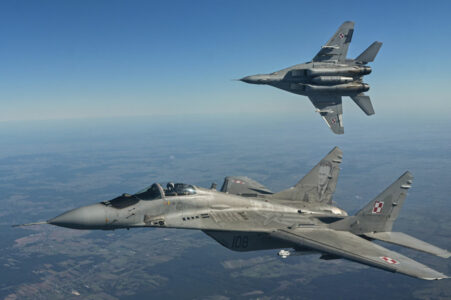Written by Owen Matthews. Originally published by The Spectator
Since the beginning of Russia’s invasion of Ukraine, China has played a decisive – though publicly low-profile – role in strategic decision-making in both Washington and Moscow. As I report for the first time in my new book Overreach, it was a back-channel intervention approved by Beijing that caused the US to scupper a deal for the Poles to provide Soviet-made MiG-29 jets to the Ukrainian Air Force back in March. And since September a flurry of personal diplomacy by Chinese foreign minister Wang Yi with Nato and the US has led to a rare moment of public agreement over Russia, when Xi Jinping said that the world ‘needs to prevent a nuclear crisis on the Eurasian continent’ in a meeting with Joe Biden at the G20 summit in Bali.
Throughout the war, China’s true position on the Russia-Ukraine conflict has been hard to pin down – not least because Beijing has been telling both sides what they want to hear. In March, Wang implicitly appeared to be blaming the US for ‘stoking tensions’ and ‘sowing discord’ with Russia. Last month he told his Russian counterpart, Sergei Lavrov, that ‘China will also firmly support the Russian side, under the leadership of President Putin, to unite and lead the Russian people’, according to state broadcaster CCTV. Wang also promised that ‘China is willing to deepen contacts with the Russian side at all levels’. Yet in September, on the sidelines of the UN General Assembly, Wang had told Nato Secretary-General Jens Stoltenberg that China ‘stays open-minded to dialogues and exchanges with Nato and is willing to jointly promote the sound and steady development of bilateral relations … in the spirit of honesty and mutual respect’.
So whose side is Beijing really on? The reality is that China has consistently backed only one side – its own. But the illusion of Chinese support was one of the many miscalculations that led Vladimir Putin down the road to war. At a summit in Beijing on 4 February this year, Xi and Putin announced a ‘friendship without limits’ with ‘no forbidden areas’ of cooperation. Both leaders declared the new level of Sino-Russian strategic partnership ‘superior’ to the alliances of the Cold War era. Beijing was aware of Russia’s plans for a military operation, according to a source with longstanding close ties to the top levels of China’s political and military leadership. But the Russians presented the coming military operation as a ‘limited operation to recover a lost Russian province [and] reunite Russia within historical boundaries’. That narrative fitted China’s own over Taiwan – though it was made clear that the Russian operation must not interfere with the Beijing Winter Olympics, which ended on 20 February – four days before Putin’s invasion.
Most importantly, in a confidential annexe to the ‘friendship without limits’ was a mutual security guarantee that Russia had sought from China for decades but hitherto been unable to obtain, said the source. Like Nato’s Article 5 – that an attack on one member is an attack on all – Beijing and Moscow pledged to come to each other’s aid militarily in the case of a foreign invasion of their territory and if special conditions were satisfied concerning the cause of such an invasion. That extremely canny and prescient proviso, inserted at Chinese insistence, would effectively exclude territories recently annexed during wartime, thus releasing Beijing from any commitment to respond to attacks on annexed territories in Ukraine.
The scale of Russia’s military operation – in particular the closely held secret of the blitzkrieg attack on Kyiv, of which even Lavrov was unaware as late as 21 February – took Beijing by surprise. Though the Chinese officially supported Putin diplomatically, blaming Nato for provoking the conflict, there was deep (and entirely well-founded) concern that Putin had overreached and would provoke the West into a united front that a limited operation in Donbas would have avoided. Putin’s threat of nuclear escalation on 27 February alarmed the world, including the Chinese. A key priority for Beijing was for the Russo-Nato confrontation to ‘avoid any nuclear escalation and to help in reaching a ceasefire’, said the source, who has regular personal contact with the leaders of the People’s Liberation Army (PLA). Now Putin had – recklessly in Chinese eyes – played his most dangerous card right at the beginning of the conflict.
So when, a few days later, a further escalation threatened in the form of an offer by the Polish government to supply Ukraine with its entire fleet of Soviet-era MiG-29 fighters, the Chinese grew concerned. In truth, there was little likelihood of the Polish MiGs making much difference on the battlefield. Poland’s 26 to 33 MiG-29s had been made in the early 1980s for the East German Air Force and had been sold to Warsaw for the symbolic sum of €1 each in 2003. Romania, which owned 20 similar MiG-29 jets, had decommissioned them many years ago. Nonetheless, a Nato country providing fighter jets of any kind to Kyiv represented an important symbolic, if not necessarily operationally significant, step towards direct Nato involvement in the conflict. Initially, Washington was positive. But a day later, on 8 March, the Pentagon abruptly reversed its position, pronouncing Poland’s proposal ‘not tenable’.
What changed Washington’s mind? In part, it was an urgent and confidential back-channel initiative involving former European leaders and senior officials, and ultimately endorsed by the Chinese. Ever since Putin’s 27 February declaration on nuclear readiness, the PLA had also been reaching out through military-to-military (as opposed to diplomatic or political) channels to senior Russian general officers with whom they had made personal contact over years of joint military exercises and military procurement talks. Beijing’s aim was to ensure that even if there were a political decision to use nukes, the Russian army would insist on sticking to its long-standing nuclear military doctrine to use them solely if provoked by attacks on Russian soil. Through these unofficial ‘track two’ contacts, Washington and the PLA agreed – unusually, given a deterioration in relations during the Donald Trump presidency – that if the US stopped the MiG deal, Beijing’s generals would do their best to defuse Putin’s nuclear threat on an operational level. ‘It worked,’ said the Chinese source. ‘The [US] decided that supplying aircraft was a step too far.’
Though this back-channel initiative of early March has not been previously reported, the fact that the US retained a fundamentally cautious attitude to supplying strategic weapons to Ukraine throughout the war effectively confirms that Washington, remained deeply aware of Chinese concerns, which were shared with many of the largest nations in the European Union. Despite a dramatic escalation in supplies of money and military hardware – including Nato-standard 155mm artillery capable of firing guided shells and the High Mobility Artillery Rocket System – Nato has held back on providing attack aircraft, helicopters, Nato-standard tanks, long-range battlefield missile and cruise missile systems.
At the same time, Chinese backing for Moscow remained equally cautious. Beijing offered diplomatic and informational support – but excluded significant military cooperation, forcing the Russians to buy drones from Iran, cannibalise domestic appliances for computer chips and attempt to buy back helicopters, missiles and missile defence systems from its military customers around the developing world. The threat of US sanctions on their global operations caused many leading Chinese banks such as ICBC, the New Development Bank and the Asian Infrastructure Investment Bank to withdraw credit and financing from Russia. Chinese energy giants such as Sinochem also suspended all Russian investments and joint ventures. In August, UnionPay – the Chinese equivalent of Visa and Mastercard – also ceased its cooperation with Russian banks, citing sanctions. The material motivation for Beijing’s corporations to pull out of Russia was clear: before the war China did $100 billion in trade with Russia (rising by a projected $30 billion this year thanks to increased oil imports) but more than $1.5 trillion with the US and EU.

Joe Biden and Xi Jinping shake hands as they meet on the sidelines of the G20 Summit in Bali, 14 November 2022 (Getty Images)
With Biden and Xi’s joint condemnation of the threat of nukes at Bali earlier this month, the so-called ‘track two’ understandings of March have become a ‘track one’ public policy. Thanks to Wang’s shuttle diplomacy, Nato and China have effectively aligned on not escalating the Ukraine-Russia conflict, according to the Chinese source. Over a series of meetings with Nato leadership since early September, Wang pledged to use China’s considerable leverage in Moscow to dissuade Putin from using nukes, while in return Nato has affirmed that they would not provide strategic weapons to Ukraine.
At the Bali summit Xi (backed by Indian Prime Minister Narendra Modi) publicly called for a ‘return to diplomacy and stressing the urgency in finding a peaceful resolution’. That’s a position yet to be officially embraced by Nato, which insists that the Ukrainians will decide when to come to the negotiating table. But many senior voices in Nato – for instance the US chairman of the joint chiefs of staff Mark Milley and France’s Emmanuel Macron – have independently suggested that Kyiv should prepare for peace talks. And China’s security guarantees of Russia’s pre-invasion borders made back in February could play an important role in building a face-saving off-ramp for the Kremlin as a counter to Nato’s likely security guarantees for Ukraine.
China’s price for its peacemaking? Beijing hopes to improve relations with Nato and Europe and bring an end to a bloody and futile war that its ally Putin began so recklessly. In Ukraine, China is, in the words of the source, ‘ultimately positioning herself as our last hope for peace in this world’. The Ukrainians, who will likely be asked to sacrifice land for peace, may disagree.






Looks like BS and quacks like BS. A “journalist” with background in modern history, the British side of it. That means lots and lots of propaganda. Whatever he can say has little value.
Agree with you. The whole article stinks of a sitting-on-the fence attitude. But published in The Spectator, so what else can you expect…………
I’m surprised too that Southfront posts this smoke of war BS directly from Langley and MI6
“China’s price for its peacemaking? Beijing hopes to improve relations with Nato and Europe and bring an end to a bloody and futile war that its ally Putin began so recklessly.” OMFG!
România should provide the fuel for Ukronazy planes. Putin would be extatic 😂 . Just search for Romanian jet fuel coruption 😎
What Rubbies “”” Putin began so recklessly “”.. Author is Nato Paid …Russia Cretates New World Order From Leadind Of Russia Putin .. Russia Only needs Money From China …India Can Also Ootion For Russia
Several statements in this article do not ring true. First is the claim that Putin threatened nuclear war. He did no such thing, this was western propaganda. He stated that any nuclear attack on Russia would precipitate a like response. He in no way spoke of escalating to a nuclear attack unilaterally and the Chinese know this. Neither Russia nor China want or threaten any sort of escalation to nuclear weapons. Second is the claim that the Chinese viewed the Russian entry into Ukraine as reckless. Putin expressed Russian goals explicitly and clearly. The Chinese, in their confrontations with the west, realize that Putin had no choice and he simply pre-empted a Ukrainian attack which would have started a far worse conflict. Were the Russians to have waited, the situation would have been dire and the rules of engagement would have been much different…in other words, the conflict would have been wider and far more dangerous. The Chinese certainly did not want to see this and they were fully aware that Putin was going to go to war and that he had no choice. One has to wonder where this author gets the idea that the Chinese position on a nuclear escalation is related to Russian threats, as no such thing happened. The threat of nuclear weapons use was proffered by the west in the form of tactical nukes, which was what Putin responded to. The Chinese know the difference between reality and western BS, they experience this daily in their own dealings with the west. The statement on nuclear confrontation was more likely aimed at the west, regardless how the western media portrays it. The only thing in this article that rings true is that China acts in their own best interests over that of other players. This what all countries do primarily. Another point is that China knows that the west is provoking the Taiwan situation and that they will likely have to deal with this militarily sooner or later, especially as the US continues to arm them…ala Ukr. If this should happen, they would need to have Russia back them up and not on sit the fence. This article smells like western media propaganda for the home crowd. As for the washer chips, buying back weapons from customers, this smells even more like western propaganda of claims of desperation in Russia…like the continual claim of Russia running out of missiles. Ask the Ukies about that.
Bullcrap. This is a hint of what’s going on, but leading to wrong conclusions
If the wanton act(s) of NATO terrorism that include sabotage of it’s infrastructure, torture, death and destruction of it’s own people and that of the Eastern Donbas the last 8 years since “Maidan 2014” wasn’t enough for Russia to part company from the Ca$in0 for “GOOD”… Perhaps this https://www.zerohedge.com/geopolitical/ridiculous-reality-russian-oil-price-cap-debate-one-picture will urge them on to starting a new clubhouse in their jurisdiction away from 405 E 42nd St, New York, NY 10017
P.$.
Fuck India and China for not resigning their membership in Manhattan in helping Russia make that Freedom posible!
Putins reckless war my fucking ass man!!! The US and Nato planned to DESTROY Russia you Fucking Moron!!!!
I agree with the other comments: the article is somehow strange and seems to saw mistrust between the relations between China and Russia.
At the same time it misinterprets the Chinese foreign policy. To hold oneself back and not to meddle doesn’t mean , you only follow your own interest.
The issue with the Mig-29-planes is exaggerated in my opinion , I don’t see why China had to intervene first to cancel the Polish plans. It was obvious , that it wouldn’t work. The jets were not this important to become game changer in the conflict , they could be easy destroyed once there were in Ukraine (or even on the way from Poland).
And the idea , they start direct from Poland and attack Russians, was a bad joke.
The story with Migs-29 distracts rather from more important Chinese support like not following sanctions against Russia , political support in different organisations and constant military cooperation.
Your “analysis” lacks “intelligence”. What a pity to see just another pretentious rag amplifying the same western “formulas” about this conflict, leaving out the most important part of a real analysis, like why is China undoubtfully going to support Russia in case of escalation with NATO and the US? Very simple, because they know (and the US has already signaled this loudly) that they will be next down the list of countries that have to be “weakened” or outright “defeated” by the West (the US and its cronies). They know that the US cannot be trusted AT ALL!! They say one thing and do the opposite. We are witnessing the rise of a new world order, in which the US will be relegated to the dustbin of history as a bully and a failure… unless their arrogance compels them to use nuclear weapons and end everything; in fact they already modified their doctrine on “pre-emptive use of nuclear weapons”… why would they do that?
Before Russia arm force enter Ukraine,Russia already ask China for full support .
The author of this article is a buffoon. Right away he says “Russian invasion of Ukraine.” That is an outright lie. War in Ukraine started with the U.S. funded violent Maidan coup in 2014. This is known fact.